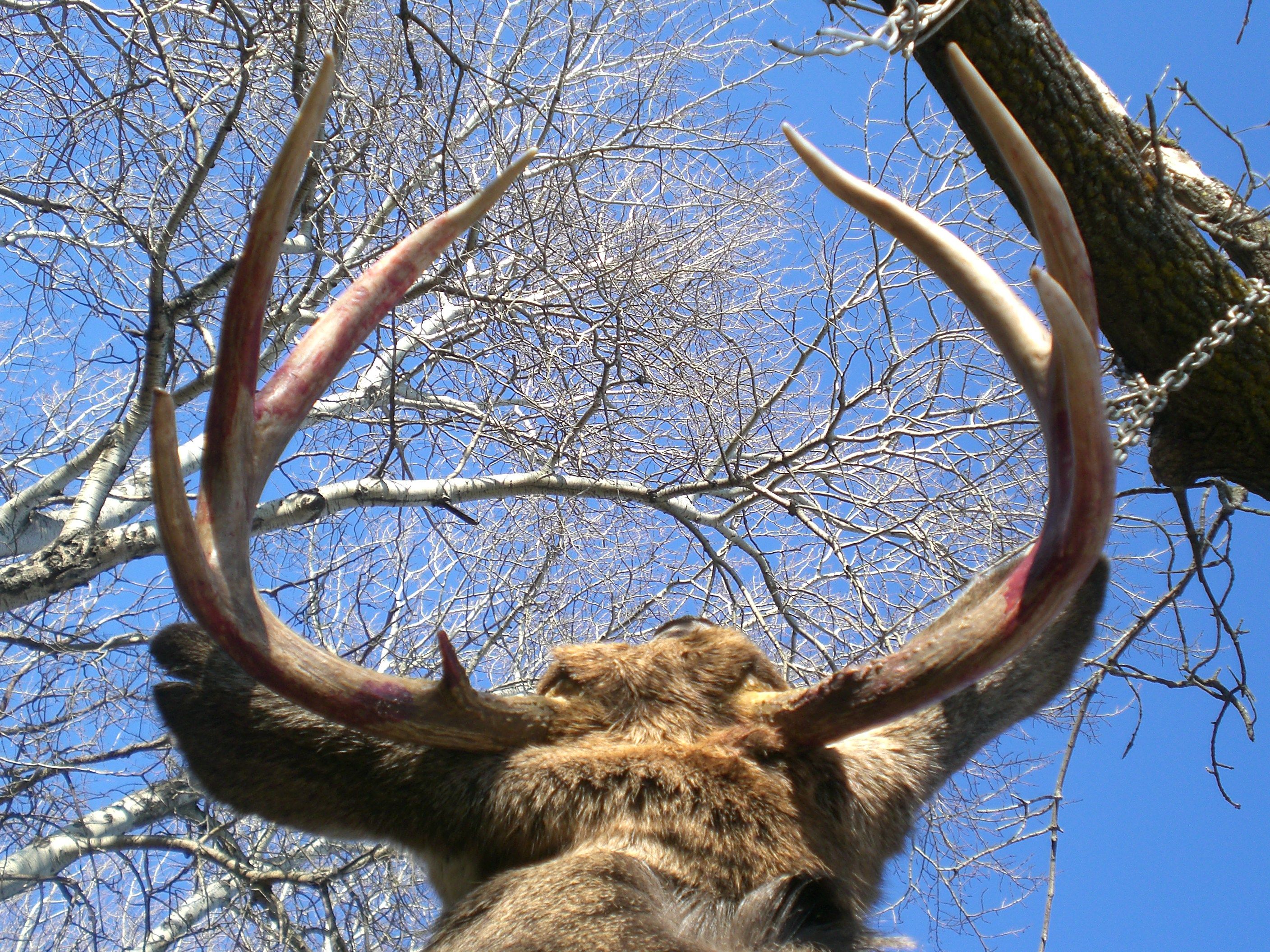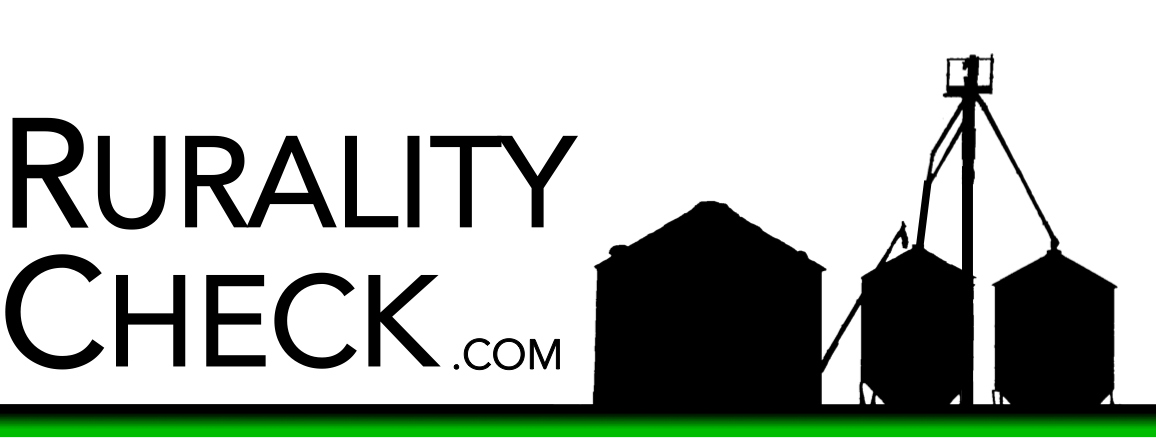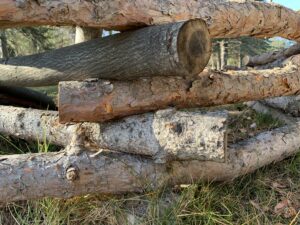
You know the old joke: A man goes fishing, and his wife packs him a lunch. He comes back angry, saying that she forgot to pack the lunch.
She says, “I packed it in your tackle box.”
The caricature of rural people, or at least rural men, includes gun-toting rednecks who love killing animals. There’s a kernel of truth there. For most hunters, though, the hunting isn’t the point. Here we’ll unroll a more nuanced view of why many hunters hunt, including reasons that have nothing to do with meat or manliness, or even male bonding. It’s an animal-centered view that may surprise you.
My extended family and I are pretty casual deer hunters. We have a range of “woodsiness” in our group, but no one would claim to be a master outdoorsman. We hunt in enclosed stands that resemble icehouses on stilts. (Or, for those unfamiliar with icehouses, big wooden boxes with doors and windows. Ours have plexiglass.) We shoot deer from 100 or 200 yards away through scopes, which more closely resembles a video game than anything remotely relating to Daniel Boone. We hunt for a few hours each morning and evening—deer are most active around dawn and dusk—but spend a lot of the day in the cabin, hanging out. As the group ages, more of this time turns into nap time. We drink a lot more coffee than Daniel Boone, too. At night, we make burgers on the grill and drink beer.
For us, hunting isn’t about the meat or the trophies, either. Some of us take our meat home, but some of us donate it to a family that eats only game meat—when we show up with a pickup-load of deer, they are grateful in a way that few others are, about anything. We typically mount antlers worth mounting, but many of us keep them in garages or even in boxes the rest of the year.
It’s not the out-for-blood, jacked-up-pickup, Busch-Light crowd. It’s more the playing-dice, Chrysler-minivan, Folgers crowd.
A lot of people are this way.
Sure, we like being outside, and many of us spend far too much time inside, so it’s a good change of pace. But the main reason we hunt has little to do with the outdoors: it’s the only thing we still do together. For us, hunting is probably best described as a family reunion, and the fact that many of our wives won’t go near the place happens to make the whole affair predominantly male. (Our sisters and daughters might come out for the Saturday meal, though. Also, female hunters are becoming more common in our area—they often choose to wear pink instead of orange.) Like a family reunion, the focal point is seeing each other, which translates to hearing everyone’s stories, old and new. The emphasis is the cabin, not the woods.
There’s also history: we hunt on the “century farm” where my great-grandparents lived. We sleep in the farm’s original house (though my great aunt, I think, added on to it sometime when my dad was young, I’ve been told). The barn is gone, and the yard is grown over, but we hang deer in the same tree every year. It’s a thing.
But why hunt deer at all, then? If hunters are in it for the get-together, why don’t they just get together?
This is a good question, and the answers are not obvious. For example, the answer has nothing to do with the supposed fruits of hunting: the meat. Any hunter who keeps his meat will tell you that, all things considered, it’s more expensive than anything in the grocery store. Per pound, it probably approaches the market price for flamingo steaks, or for elephant foreskin, or something.
Also, I’m not sure it has much to do with the actual hunting, as sitting in a deer stand in northern Minnesota in November is just a whole lot of sitting in the cold, which to the untrained eye probably resembles some sort of disciplinary tactic during a Siberian school’s recess, or maybe a training regimen for Inuit shamans. I guess it might be like a spirit quest, kinda, if spirit quests involve not being able to feel your face and praying to find your spirit animal so you can shoot it and go home to drink coffee.
Seems like a stretch.
Instead, the reason to hunt during our get-togethers probably has more to do with family logistics and, a bit surprisingly, the animals themselves.
Logistically, without hunting I’m not sure that our extended families would get together at all. These days, as people’s kids have kids of their own, holidays seem to be focused more on grandchildren than on brothers and sisters. As a result, doting grandparents don’t get to see their own siblings at the traditional holiday times, especially when distances are involved, especially in wintertime in late December in Minnesota, when travel can be unreliable. People’s original nuclear families tend to take a backseat to the growth of the family tree, and hunting is an excuse for family time with the trunk of that tree away from high-demand holidays. Thankfully, the cultural norms in rural areas allow us to leave work for a few days in the fall to “hunt deer,” or to make those secondary reunions possible.
Now to the main event. A less intuitive reason to hunt during our get-togethers is a concern for the animals themselves. If it seems odd to suggest that hunting animals is actually a kindness, please stay tuned, even if you’ve heard arguments like that before—arguments for animal welfare and hunting typically follow one of a few common arcs, and we will start by dispensing with some of them here.
First, and as mentioned, it’s hard to take seriously any arguments based on meat, or meat quality. Cost aside, venison is pretty tough (backstraps excepted), and cooking with it is tougher than cooking with a typical meat from the grocery store. Even if you subscribe to the idea that grocery-store meat is inferior to more natural meat, as I do, I would offer that rural people often have connections for obtaining good meat on the hoof, and those options are often more economical than hunting it. Further, arguments that you appreciate meat much more after butchering it yourself—again, I also subscribe—are flattened by the connections mentioned above: you can butcher a half-beef to the same effect.
To quickly dismiss other arguments about meat and its husbandry: if you want an anatomy lesson, shoot a squirrel; if you like the taste of venison, now we’re just talking about preferences; and if this is really a connection-to-nature kind of thing for you, then I’m sure you hunt with an atlatl and make all your clothes out of the hide, too, but I’d also ask why you can’t get the same thing from hugging a tree. So no, I don’t think we can make a strong argument for hunting as a uniquely good option for obtaining meat, or as some sort of spiritual quest, especially if that quest includes a pickup, a scoped rifle, and an icehouse-on-stilts tree stand. I say these things as a hunter. Let’s move on.
A better argument for hunting animals instead of buying meat at the grocery store, I think, involves the animals’ well-being. But here comes the twist.
The common animal-welfare argument for hunting, at least as I’ve heard it, goes something like this: If we’re going to eat animals, anyway, it’s probably more humane to let them live in the wild before shooting them, rather than pack them into industrial farms and slaughter them. This sounds nice. Of course, there’s a counterargument involving scale here: to produce as much meat in the wild as we currently consume would require more land than we have, so the industrial farm is a result of economic demand.
Sure, sure. But we’ll let this slide, in part because there’s probably a hybrid solution, and in part because we’ll take another route entirely.
Instead, we’ll focus on the fact that this entire wild-versus-farm argument hinges on the eating of meat in the first place. I eat meat, but I understand a vegetarian argument that points out that the whole “it’s better for animals to let them live in the wild before we eat them” line of thinking can be undercut by vegetarianism. If nobody ate meat, then the whole question becomes moot because there would be no demand for meat. Therefore, the thinking goes, the people who would still want to hunt would just be blood-thirsty killers.
Again: sure, sure. But I also understand the counterargument to that counterargument, that eating meat is natural for humans, that we have canine teeth for a reason, etc. It doesn’t matter—we’re going to scrap all of that, too, and take another route.
That other route goes through the rural landscape. You’ve gotta think about the land itself, in real life, in real terms. This is where so many people get confused.
I grew up amidst thousands of acres of farmland. Literally. Millions, maybe. There was little else besides farmland, roads, windbreaks, and the occasional tiny town or tiny farmstead for miles and miles. Again, literally. And what comes from those square miles after square miles of farmland? Food for people, sure. But food for animals, as well.
And that food for animals is a major ecological force. “Wild” animals in agricultural areas grow up with an abundance of food, and a more energy-rich abundance of food than anything they could have possibly experienced throughout their pre-agricultural evolutionary histories. Fields and fields and fields of corn and soybeans and wheat and oats and barley. There is little check on population growth of “wild” animals in these areas, at least in terms of resource abundance.
And then it goes away. Starting in late summer, all of that food practically vanishes—whole fields of hundreds of acres harvested in a mere afternoon. In the period of a month or two, the entire nutrient base that was the foundation of whole herds of deer, for example, just disappears.
And the population crashes. It was made too big by the overabundance of food, and it crashes hard when there are so many mouths to feed in empty, stubble-covered fields. Especially when the snow starts to fly and the mercury drops.
Enter the hunter.
See, the stereotypical view of the rural hunter is someone who leaves the cabin and walks into the vast, untamed wilderness, like a frontier trapper heading into a panorama of mountainous forest. He probably has a rawhide map, or something. In this view, the hunter is disturbing nature; nature strains to support all of the hunting that humans do.
I suppose this applies in some cases. Most of the time, though, reality manifests as someone walking a few hundred feet in blaze orange out to an icehouse on stilts that sits over a hundred acres of chopped cornstalks, waiting for a deer to appear from the tree row, and blasting it from a hundred yards away. Of course, while he was waiting for an adult deer he chose not to blast away at the twelve or fifteen fawns that were dancing around the trees all morning like bees around a hive.
Many, and probably most, hunters in rural America don’t hunt in The Woods. They hunt in the woods. Or, more accurate, they hunt on the edge of the field, by the woods. In view of the cabin and several pickups in various states of disrepair.
If hunters didn’t hunt in agricultural areas, there’d still be massive die-offs in the deer population after the food disappeared. A lot of that would come from starvation. Actually, a lot of it would come from cars, too. Either way, any outcome that does not include hunting is either inhumane or dangerous, or both.
And a lot of that problem is simply a consequence of agriculture.
See, this has nothing to do with eating meat at all. Who cares if it’d be more humane to eat meat that grew up in a barn or grew up in the woods? Even if nobody ever ate any meat—even if literally everybody were a vegetarian—we’d still have huge swells in the deer population because of the plants that we grow in the fields. Hunting isn’t inevitable because we eat meat—hunting is inevitable because we eat plants.
And as long as we’re growing plants to feed billions of people, the deer are going to see their overabundance of food disappear each fall, and it’s still going to be the humane and safe thing to do to kill some of them.
Weird, right?
Now, let’s address a couple of technical points. One might argue that nature might also keep the deer population in check with disease or other predators. In the former case, I’m not sure that’s any better from the humane angle. The latter case is also mistaken, I think: if populations of predators balloon to match the swell of deer, you’re set up for a major crash, of both the deer and predator populations. Also, one runs up against reality, or rurality, pretty quickly again: farmers and ranchers who raise animals are going to have problems with a huge increase in the wolf population, for example, so now you’ve got wolf hunting, which doesn’t seem like a big improvement. And wolf meat isn’t much to eat, I wouldn’t think.
Also, one might make the point that much of our agricultural products are fed to livestock, meaning that if we stopped eating meat, we wouldn’t need to grow all of the grains that keep the deer population so high. This is doubtful: farmers would merely grow something else that the deer would eat. Also, if you think deer go nuts for field corn, which is fed to cows and pigs, try keeping them out of the sweet corn that humans eat. Gardeners the nation over know that this doesn’t solve the problem.
But I digress. Circling back, most rural people who hunt are not obsessed with hunting itself, but treat it as ritual, and maybe family bonding. Also, by hunting, these more casual hunters are not demonstrating an inhumanely cool and cruel attitude towards animals. Instead, most hunters would just rather shoot a deer than hit one with their cars or let one starve.
So, the next time a militant vegetarian tells you that hunting is inhumane, or that hunters would be better off not eating meat, take that person aside. Tell her that most hunters use hunting as an excuse to get together with their families. Tell her about the history, the ritual, and the time in the outdoors.
When that doesn’t work, say that hunters hunt because she eats tofu.

P. A. Jensen is editor of RuralityCheck.com.
He lives in northern Minnesota with his wife and son.



